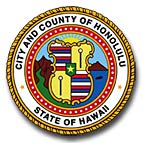Tax vote
draws out
opposition
Construction laborers will also
appear before the City Council
Waikiki resident Bob Kessler and about two dozen of his neighbors plan to car-pool to Kapolei today to tell the City Council not to raise taxes to support a mass transit project that could include rail.
"We think that the City Council has not gone out with the proper dialogue with the community about this tax," Kessler said. "I think it should be something that the people vote on."
But the proposed 0.5 percentage point increase also will have supporters.
Members of Hawaii's construction trade unions will also appear before the Council at Kapolei Hale today. They want the Council to approve Bill 40, for all the construction jobs it's expected to provide, and for drivers who fight congestion in their daily commutes.
"For our members it's critical, but also the people that live on that side of the island, they are stuck in traffic," said Adrian Keohokalole, administrator of the Hawaii Operating Engineers Stabilization fund. His union would like to see rail transit built.
The Council is expected to take the last of the three required votes today. The Council has voted 7-2 twice in favor of the bill.
"I think my colleagues have their minds made up," said Councilman Charles Djou, who opposes the tax increase.
If approved, the bill would increase the excise tax on Oahu to 4.5 percent from 4 percent. The new general excise tax surcharge would then be collected beginning January 2007.
Mayor Mufi Hannemann has said that if the Council approves Bill 40, he will sign it into law.
The Council is meeting in Kapolei Hale because Honolulu Hale's chambers are being repaired.
Councilman Todd Apo, who represents most of West Oahu, noted the significance of the location for the final vote.
"We are bringing the meeting to the place where there are the greatest number (of) traffic issues on the island, so there is a degree of symbolism there," said Apo, who is also the chairman of the Transportation Committee. "We have been encouraging everyone to attend, whatever side of the issue they are on."
While his constituents agree that solutions for traffic congestion are needed, they are split on their support of the tax increase, Apo said.
Apo has supported Bill 40 so far because the process to seek traffic solutions with federal support starts with this bill.
"We all need to be part of the process going forward to come up with answers," he said.
Djou opposes the bill because the tax increase would be a hardship. And he said that no one knows what the money will be used for since there is no final approved transit plan.
"If this passes, we're lightening everyone's pocketbook," he said.
Djou said he would like to have the City Council kill the tax increase, but he supports Kessler's initiative efforts.
But a ballot initiative is not likely to be an easy thing to accomplish.
Because the City Charter prohibits levying or repealing a tax by ballot, Djou said the first step would be to seek an amendment by ballot to reverse that law, and then have voters decide whether to actually kill the tax.
The bill doesn't specifically say that the tax increase would be used to fund a rail project but instead says it would be used for "operating or capital costs of a locally preferred alternative for a mass transit project."
www.co.honolulu.hi.us/council/index1.htm
E-mail to City Desk
[News] [Business] [Features] [Sports] [Editorial] [Do It Electric!]
[Classified Ads] [Search] [Subscribe] [Info] [Letter to Editor]
[Feedback]

